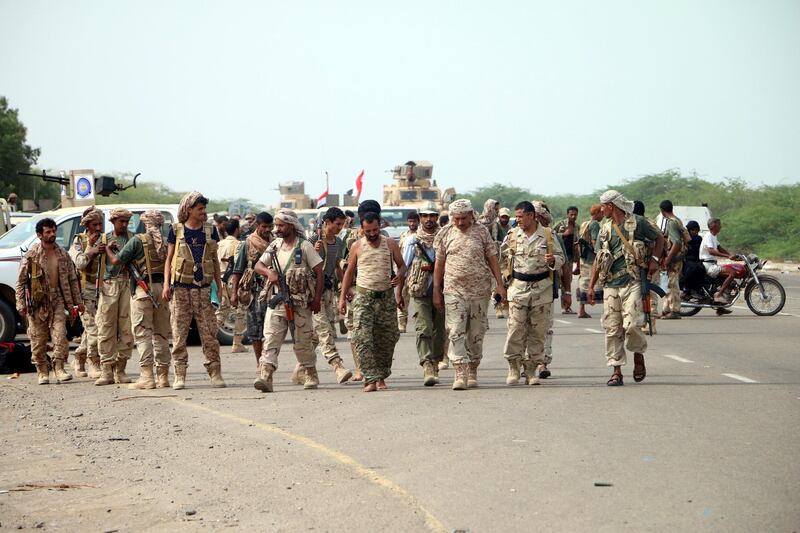With the UAE deadline for the United Nations to convince the Houthis to withdraw from Al Hodeidah expiring on Tuesday night, the Yemeni city is braced for a major military offensive against the Iran-backed militia.
A tense atmosphere was reported inside the port city, as Wam news agency said that Yemen’s National Resistance Forces were massing around the city and were on high alert for what could be a weeks-long offensive.
Photos of southern forces moving into the city were shared on Twitter:
Key to the battle will be retaking control of its port, the second largest in Yemen, and which has been used by the Houthis since 2015 as an arms smuggling entry point, as well as a source of revenue by confiscating the aid and selling it to the half-million residents of Al Hodeidah. The control of the port is also an important guarantor for naval security and navigation along the Red Sea and near Bab Al Mandab.
In April, the Houthis attacked a Saudi oil tanker from Al Hodeidah. Last year a Saudi warship was attacked from the city in an assault in which two of the crew were killed and three wounded, according to Saudi media.
_______________
Read more:
[ Gargash: UN has deadline to negotiate Houthi withdrawal from Hodeidah ]
_______________
The US navy told Reuters then that “an unmanned remote controlled boat laden with explosives rammed the Saudi navy vessel, the first known strike by a drone attack boat", adding it was likely the Houthis were responsible, "using technology supplied by Iran”.
_______________
Fact sheet on Al Hodeidah
- UN estimates that 600,000 people live in the city and its environs, and 47.5% of the population are below the age of 15
- Al Hodeidah is Yemen’s biggest Red Sea port and the only one under Houthi control. It is the country’s second-largest port after Aden
- It has been held by the Houthis since the beginning of Yemen's civil war in 2015, during which time there has been an outbreak of cholera and poverty has increased
- Al Hodeidah is situated150 kilometres west of the capital Sana’a
- Before the war began, Al Hodeidah port handled about 70 per cent of Yemen’s imports
- The Arab coalition is concerned that the port is used to bring missiles in from Iran
- The coalition had for months requested UN control of Al Hodeidah - to stop arms smuggling. Requests have not been met
- Attempt to recover the city would be the first major coalition operation in Al Hodeidah, as all efforts had been focused on a political resolution
- Coalition forces began preparations for assault on the port in late May, and have secured the coastline stretching from Khawkhah 100km south of the port city to Ad Durayhimi districts roughly 20km south of Al Hodeidah city
- UN envoy Martin Griffith has been engaging in shuttle diplomacy between the Houthi-held capital Sana’a, the UAE and Saudi Arabia in an attempt to avoid fighting for the city
- UAE issued a 48-hour ultimatum to Mr Griffiths on June 10 to persuade the Houthi forces in the city to withdraw - this expired on Tuesday night
_______________
Iran is believed to be defying UN resolutions by arming the Houthis through a sea route extending from the Iranian port of Bandar Abbas into Al Hodeidah, or by transferring shipments to small boats through Somali ports into Yemen.
US ambassador to the UN Nikki Haley has repeatedly condemned Iran’s arming of the Houthis. Last April, addressing the Security Council, Ms Haley said “to achieve enduring peace in Yemen, Iran must stop its interference and its violations of the arms embargo this council imposed”.
She was referring to UN resolution 2216, aimed at stopping Iran’s heavy armament of the Houthis.
Losing control of the port would cut a major lifeline to the Houthis and help to safeguard international navigation along the Red Sea.






